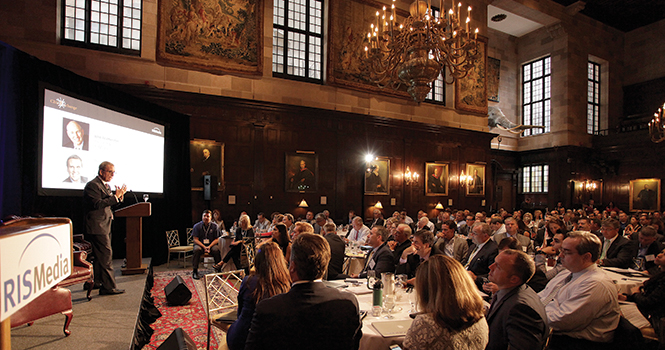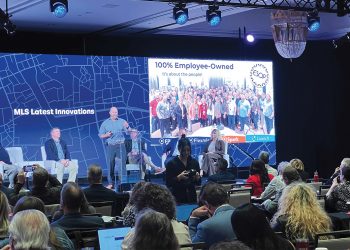Real estate has seen its share of innovation. Today, it’s on the cusp of momentous change as technology and time converge. The shift—concerning to many—was recently addressed at RISMedia’s Real Estate CEO Exchange, “Seizing the Day, Winning the Future,” putting to rest a question long lingering in the industry: Will the profession ever become obsolete?
The answer, according to Realogy Franchise Group President and CEO Alex Perriello, is a resounding no, because of the complex, multifaceted role real estate professionals play in transactions.
“The reason why we’re still relevant today, and will be, in my view, for the foreseeable future, is the amazing computing power of the human brain,” Perriello told the select 250 attendees of the event, held at the Harvard Club of New York City. “Imagine trying to program coordination, competency, compassion, commitment, collaboration, compromise, creativity, common sense and a touch of clairvoyance…it’s going to take decades for the code to be written for that. For the real estate professional to be disintermediated completely, the human species would have to make a fundamental change that they would rather rely on a robot than one another when making the biggest investment of their lives.”
Perriello, who opened the sold-out gathering with “The State of the Real Estate Union,” offered perspective with insight gained through his involvement in Realogy’s FWD Innovation Summit, which saw a record number of startup applicants in its last year—an experience that speaks to the rate at which technology advances.
“The pace of innovation is accelerating, almost at breakneck speed…and the millennials are the driving force behind most of this innovation,” Perriello said. “They’re not trying to put us out of business; they’re trying to design the future of how things will work, for themselves as consumers, as buyers and sellers of property, and also as real estate professionals.”
Shaping the future of real estate primarily are predictive analytics and team technology, as well as artificial intelligence and enhancements to “coming soon” marketing—innovations Perriello believes will augment, rather than replace, the services of a real estate professional.
“Companies and agents who’ve embraced technology and innovation will replace those who don’t embrace technology and innovation,” said Perriello. “The key is staying aware of it. Keep asking yourself, ‘Am I relevant to all the different constituents that I rely on?’”
Technology, Perriello added, is not the only agent of change real estate professionals should be aware of. Demographic trends, both in the housing market and in the industry, will also affect the sustainability of real estate as a business.
“Demographics…they don’t lie, and they’re very easy to predict,” said Perriello, referencing the significant percentage of real estate professionals closing in on retirement age. “When retire, they become irrelevant to their people, at least as it as it relates to real estate. All of that business is going to go away. It’s important as leaders to not let something like this happen, because this you can predict.”
Requiring equal attention is the charge to represent the diversity in the marketplace.
“Are you in alignment with what’s going on in your market?” Perriello asked. “Understand the demographics of your market, where the transactions are coming from, what’s the diversity, what’s the makeup of your buyers and sellers. Look at your sales force. Is it in alignment with the needs of the community you serve? Recruit people to your organization that mirror the market.”
This confluence of demographic change and technological innovation—viewed as disruptive by some—will irrevocably, if not immediately, alter the industry. For Perriello, that realization came in the darkest days of the downturn.
“A colleague of mine came up to me and asked, ‘What keeps you up at night?’ I said, ‘Some kid in a garage in Menlo Park, Calif., thinking of a better way to reinvent our business.’ I’m getting much better sleep these days, because we’ve found a way to stay meaningfully connected to that startup community.”
The end game, Perriello learned, is not disruption. Citing a recent finding, he shared that 45 percent of the tasks people are paid to perform today can be automated with existing technology, but just 5 percent of those occupations can be retired because of it.
Ultimately, the changes to come in real estate, pivotal as they are, are for the better. As Perriello summarized:
“We’re still here.”











